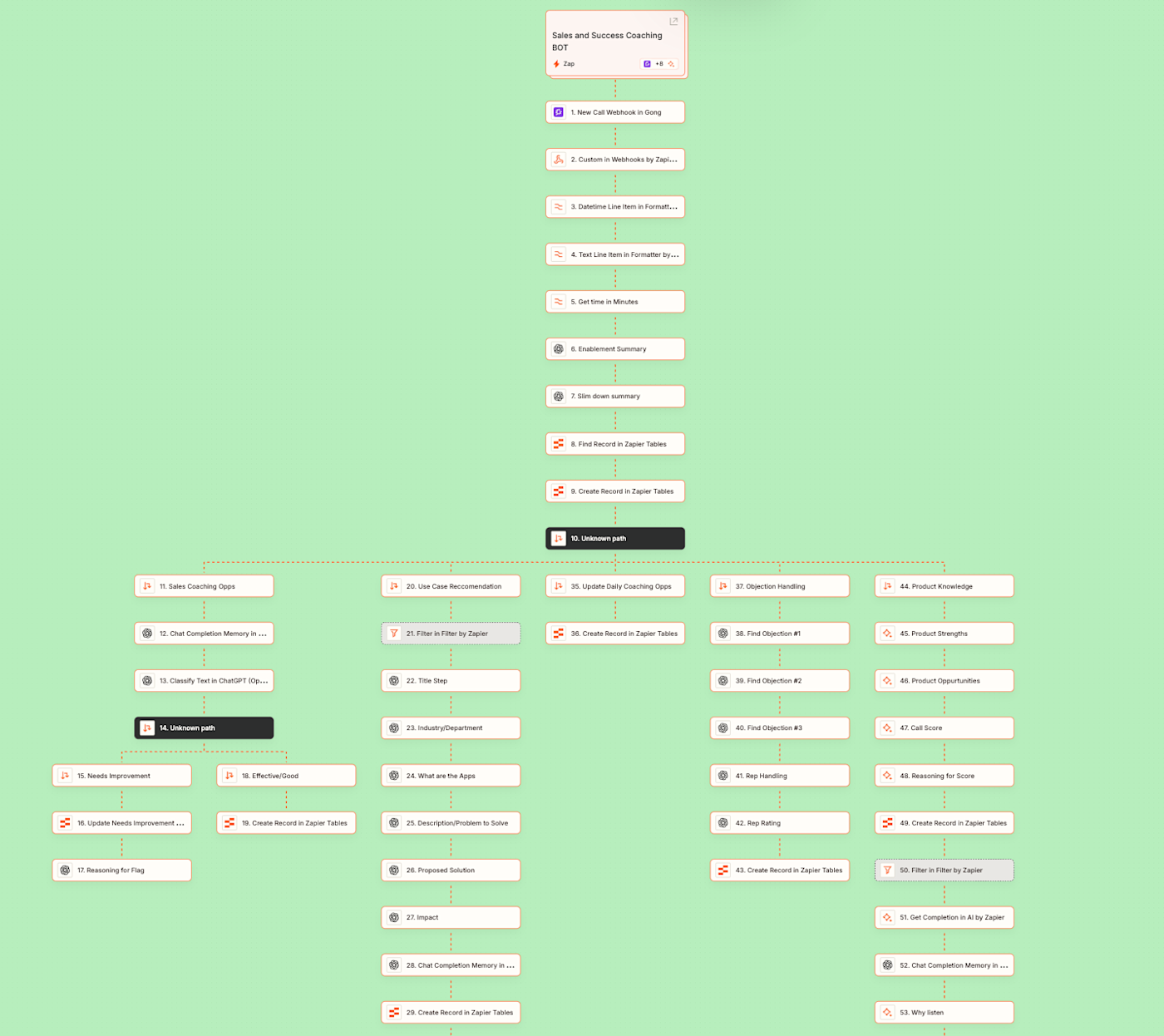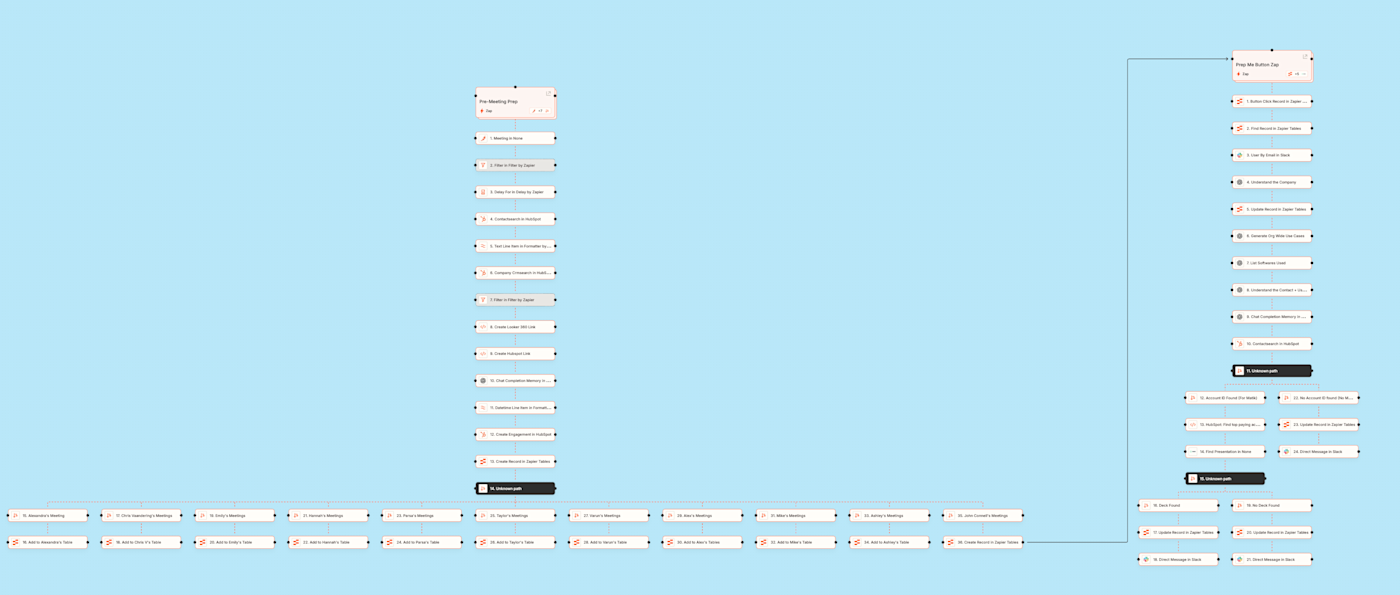In sales and customer success, your team's edge often depends on how quickly you can adapt—whether it's responding to fresh insights from a client call or pivoting strategies on short notice. And as AI reshapes the way teams operate, leveraging it effectively becomes critical. But here's the catch: AI alone won't revolutionize your sales process—automation is the real game changer.
By integrating AI seamlessly into your sales processes (and the rest of your tech stack), you can automatically give your team more space to focus on strategic conversations that close deals.
At Zapier, our Sales and Success teams rely on Zaps—our automated workflows—to streamline everything from prepping for sales calls ahead of time or providing coaching opportunities from transcripts.
Below, watch how we use Zapier and AI to elevate our sales coaching and call preparation—or keep reading for a detailed breakdown.
When Zaps have more than one action, or include filters and searches, it's considered a multi-step Zap, which is only available on paid plans.
Skip ahead
Create a sales coaching bot with AI
Sales and customer calls offer a wealth of insight into everything from individual rep performance to the specific strategies that drive deals forward. That's why turning those call transcripts into coaching opportunities can help your sales and success teams sharpen their skills, address any gaps, and consistently close more deals.
But analyzing each and every call takes up a lot of bandwidth—especially if your teams are speaking with customers multiple times a day.
To make this process scalable, Zapier's Sales and Success Enablement team built a multi-step Zap that automatically analyzes call transcripts after each call. It uses AI to generate a summary of how well reps are applying sales strategies, logs the results, and highlights areas like objection handling, product knowledge, and use case clarity—so managers can quickly spot what's working and where to improve.
Here's an example of how this kind of Zap might work—visualized in Zapier Canvas. (To see a larger version, open the image in a new window):
Workflow part 1: Use AI to analyze transcripts for areas of improvement
Zapier integrations used: Gong, Webhooks by Zapier, Formatter by Zapier, ChatGPT, Zapier Tables
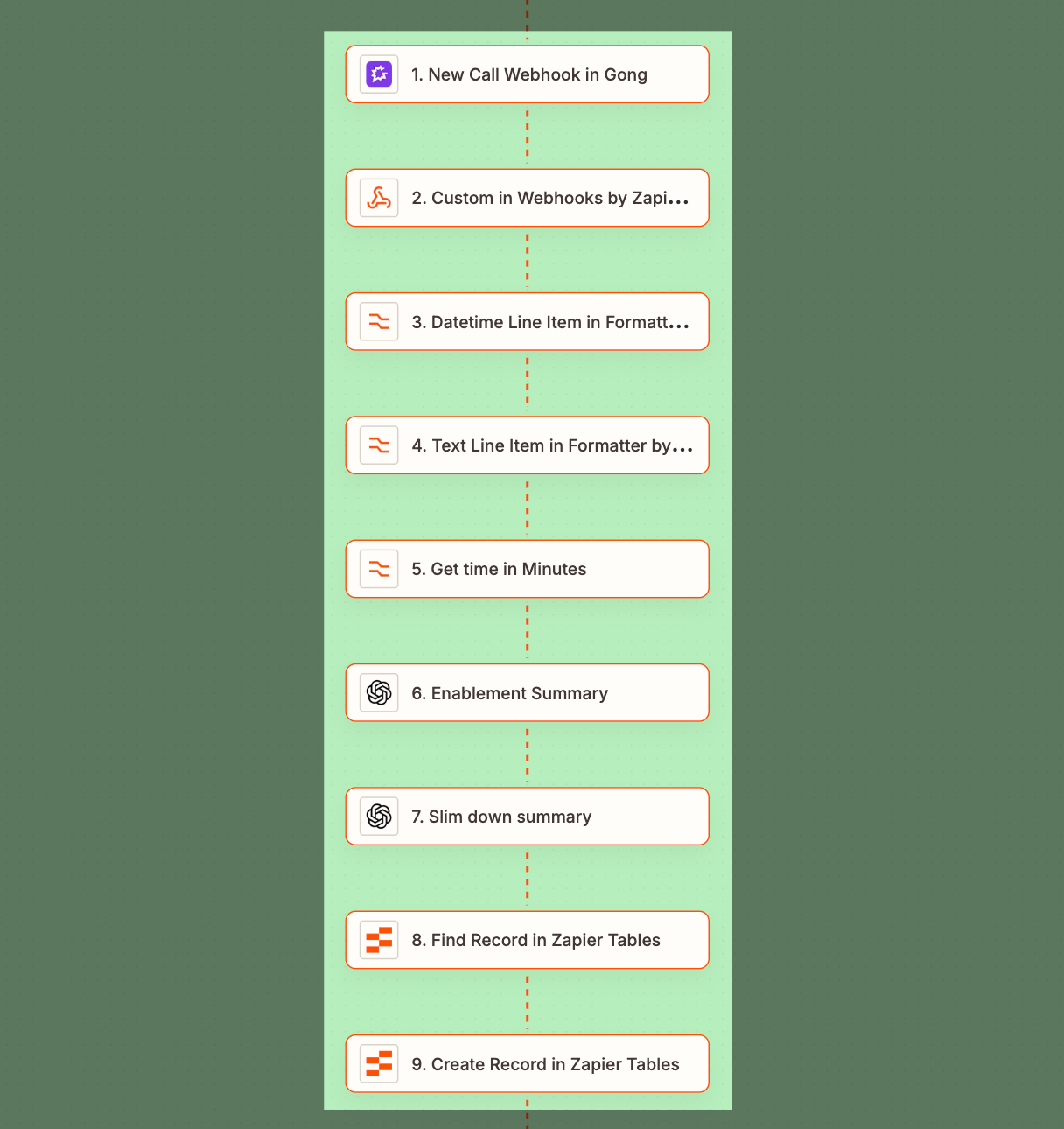
This part of the Zap captures sales call data from Gong, formats the data, and generates an AI-powered enablement summary using ChatGPT. The Zap evaluates rep performance based on predefined coaching criteria, then logs the results in Zapier Tables.
Workflow part 2: Use AI to identify sales coaching opportunities
Zapier integrations used: Paths by Zapier, ChatGPT, Zapier Tables
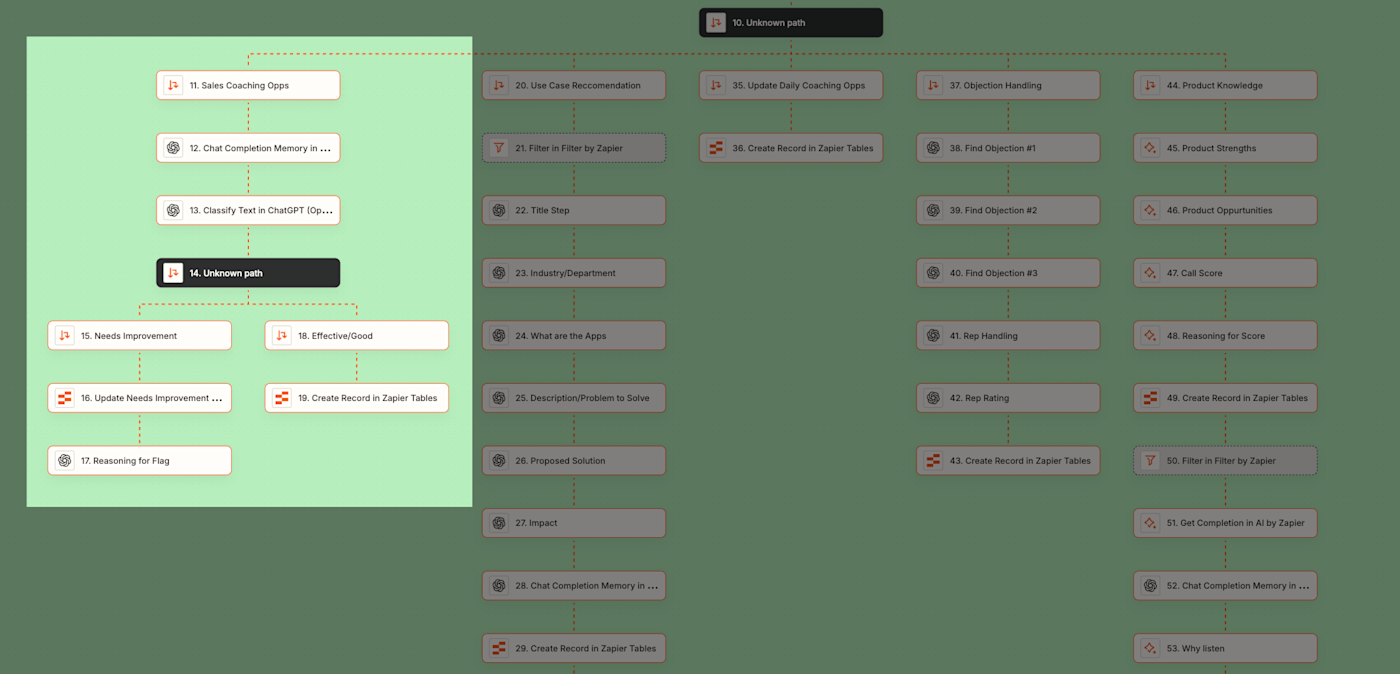
This part of the Zap surfaces sales coaching opportunities by classifying call performance using ChatGPT. Based on AI's evaluation, the conversation is flagged as either "Needs Improvement" or "Effective/Good." If improvement is needed, the Zap updates the record in Zapier Tables and logs a reason for the flag. If the call was effective, it's also recorded in Zapier Tables for tracking.
Workflow part 3: Use AI to analyze the customer's problem
Zapier integrations used: Paths by Zapier, Filter by Zapier, ChatGPT, Zapier Tables
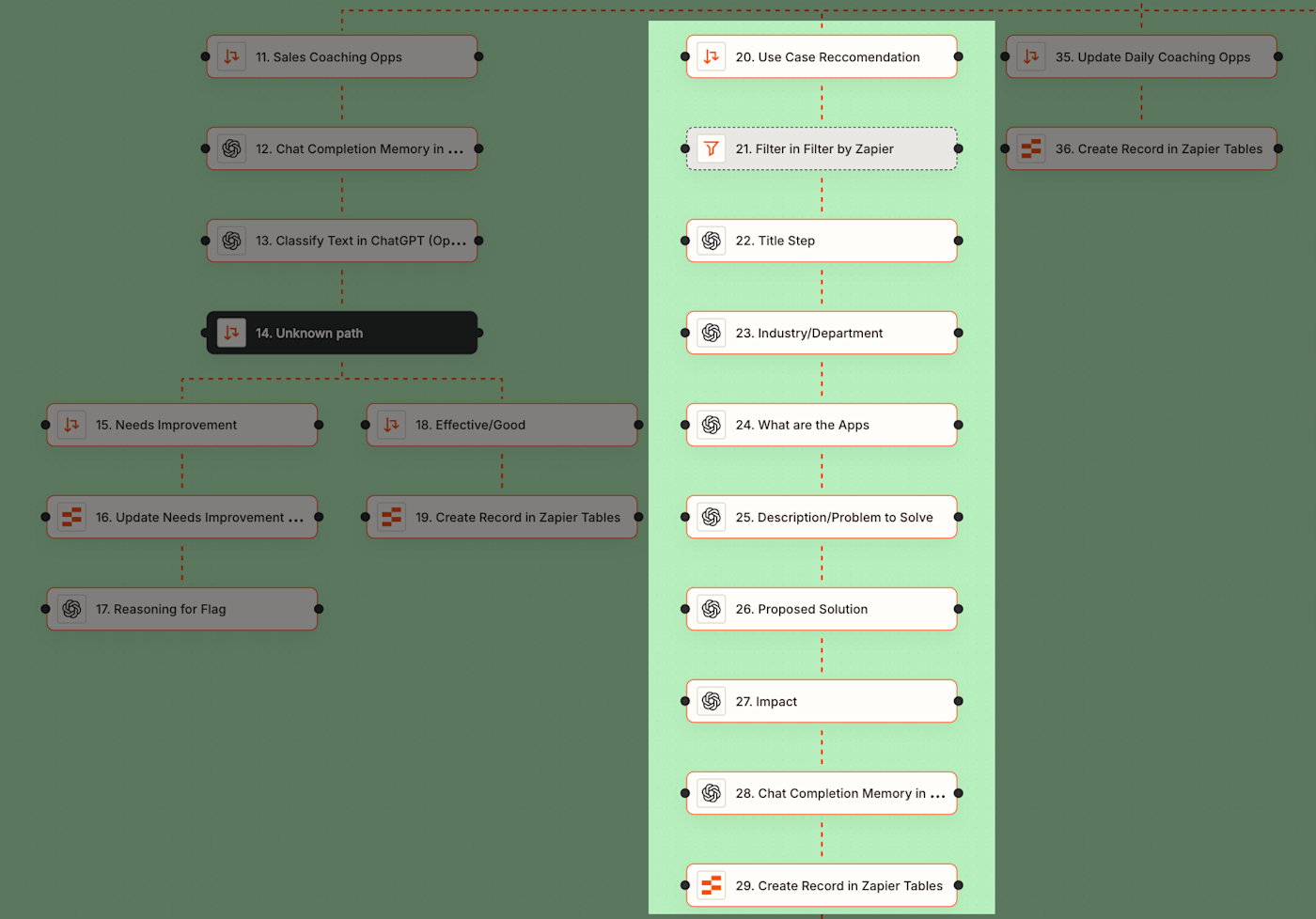
This part of the Zap uses ChatGPT to analyze sales call transcripts and pinpoint the customer's core problem, including what they're specifically trying to solve with Zapier. It also evaluates whether the sales rep clearly addressed the customer's needs and provided a suitable solution. These insights are then logged in Zapier Tables, giving your sales team actionable guidance for personalized follow-up and identifying areas for coaching.
Workflow part 4: Use AI to analyze objection handling
Zapier integrations used: Paths by Zapier, ChatGPT, Zapier Tables
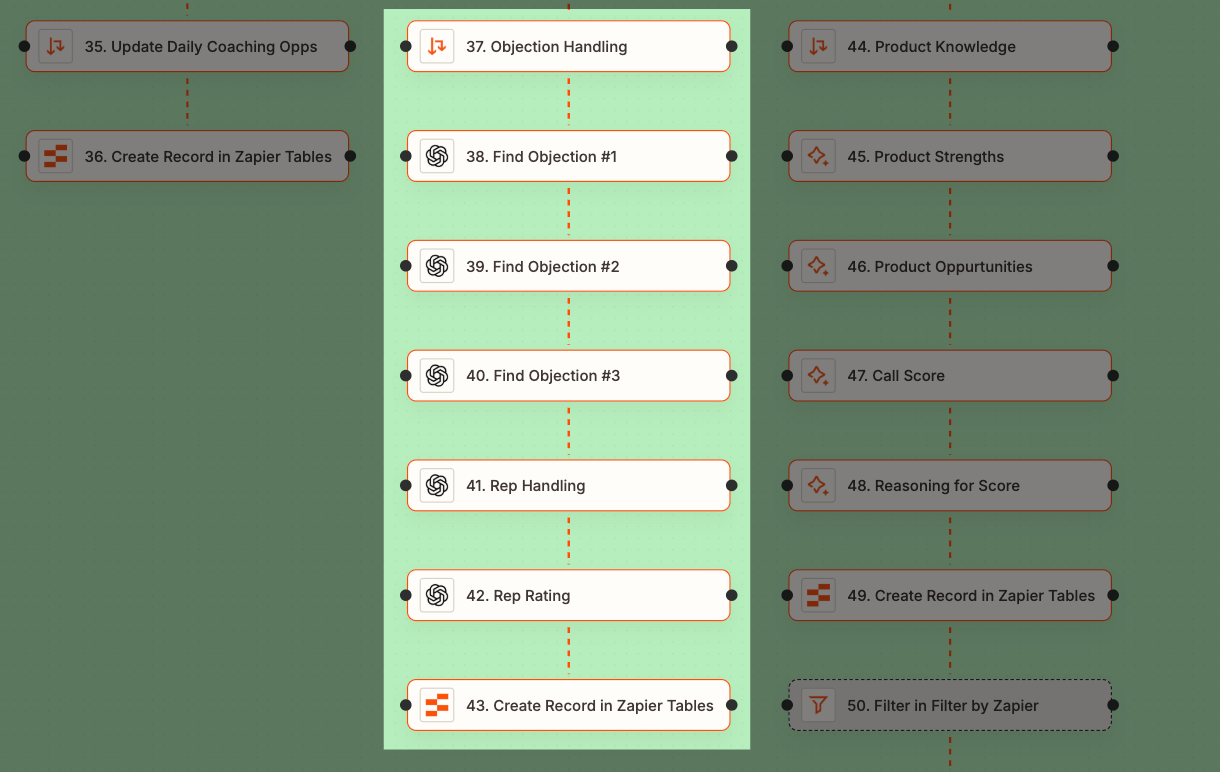
This part of the Zap focuses on objection handling by using ChatGPT to identify up to three key objections raised during the call. The AI tool then evaluates how the rep handled each objection and assigns a rating based on their response. Finally, the results are logged in Zapier Tables for tracking and future coaching opportunities.
Workflow part 5: Use AI to score a rep's product knowledge
Zapier integrations used: Paths by Zapier, AI by Zapier, Zapier Tables
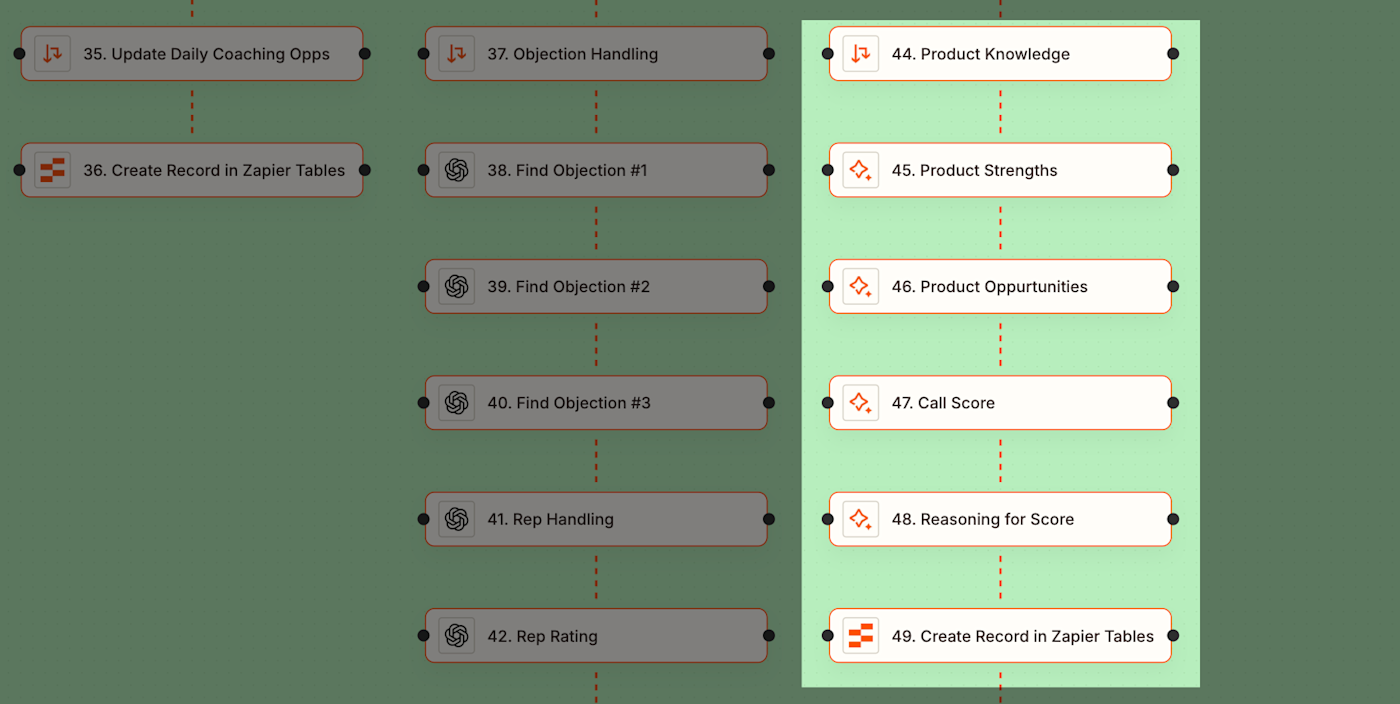
This part of the Zap assesses product knowledge by analyzing the sales call for how well the rep discussed product strengths and opportunities. AI by Zapier assigns a call score based on the rep's performance and provides a reasoning for the score. The final results are logged in Zapier Tables for tracking and further coaching insights.
Prompting tips for your AI steps
To get the most accurate results from your ChatGPT steps (or any other AI integration you might use), it's important to craft a clear, structured, and detailed prompt. Here are some tips for optimizing your instructions for the AI tool:
Clearly define the AI tool's role: Specify that the AI tool acts as a sales coach and call analyst, evaluating rep performance, objection handling, and product knowledge.
Set clear criteria: List specific sales strategies, objection-handling techniques, and product messaging points relevant to your company that the AI tool should assess.
Ensure relevant insights: Ask AI to identify key takeaways, such as effective use cases, areas for improvement, and coaching opportunities.
Summarize responses for review: Ask for categorized insights, call scores, and concise feedback that sales reps can quickly review and act on.
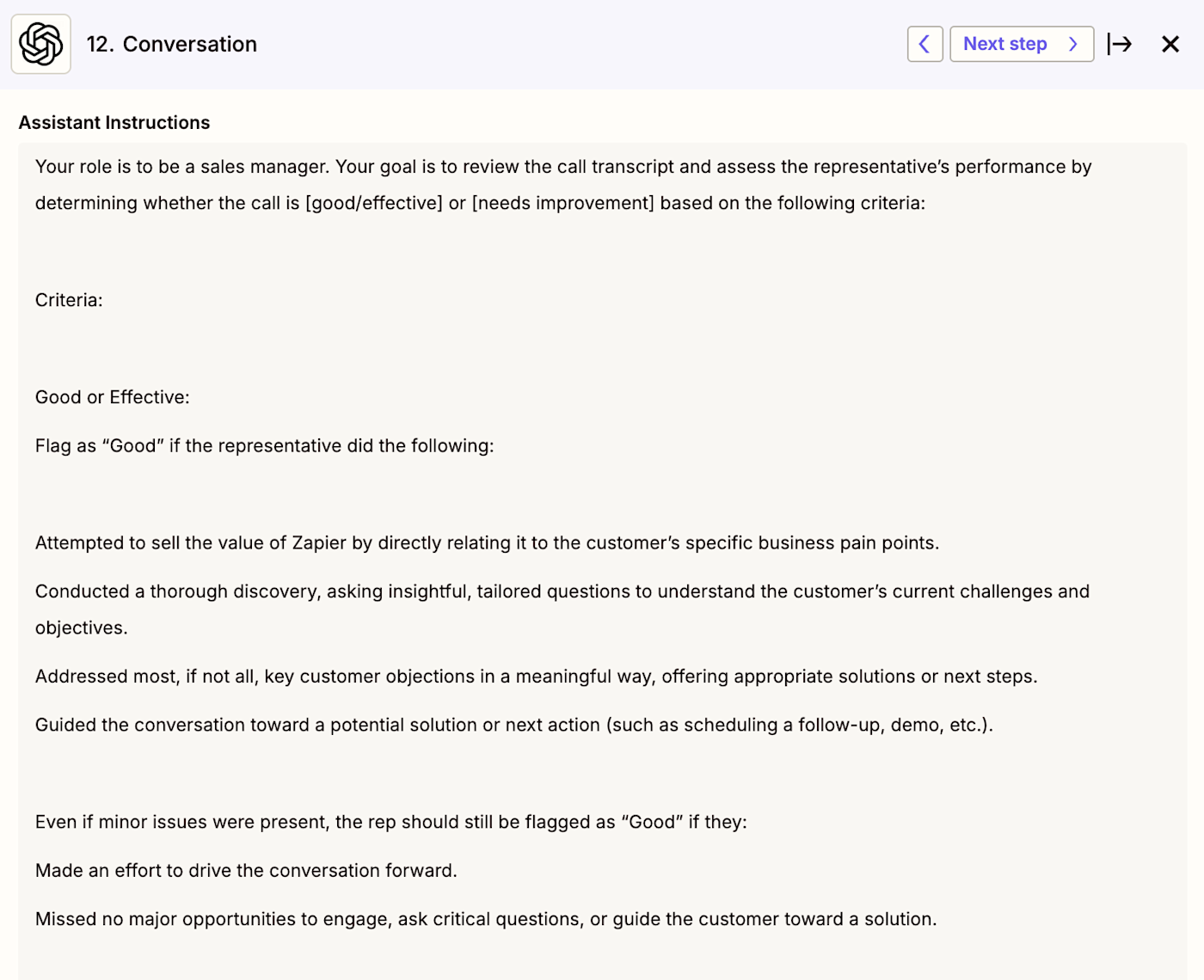
Ready to start building your Zap? Click on the pre-made template below to set up this Zap and start identifying coaching opportunities automatically.
Automate personalized coaching for your sales team using this AI-powered call analysis template.
Prep for sales calls with AI
Preparing for sales calls takes time—sales reps need to research contacts, review company details, and identify relevant talking points before every meeting. But when reps are juggling multiple calls a day, manually gathering this information can slow them down and throw them off their game.
To eliminate much of this legwork, Zapier's RevOps team built a multi-step Zap that automates pre-call research. It automatically collects relevant company and contact details, and uses AI to enrich the prospect, generate sales decks for the assigned rep, and suggest conversation points. That way, sales reps enter meetings fully prepared.
Here's an example of how this kind of Zap might work—visualized in Zapier Canvas. (To see a larger version, open the image in a new window):
Workflow part 1: Carry out customer research
Zapier integrations used: Chili Piper, Filter by Zapier, Delay By Zapier, HubSpot, Formatter by Zapier, Looker, ChatGPT, Zapier Tables
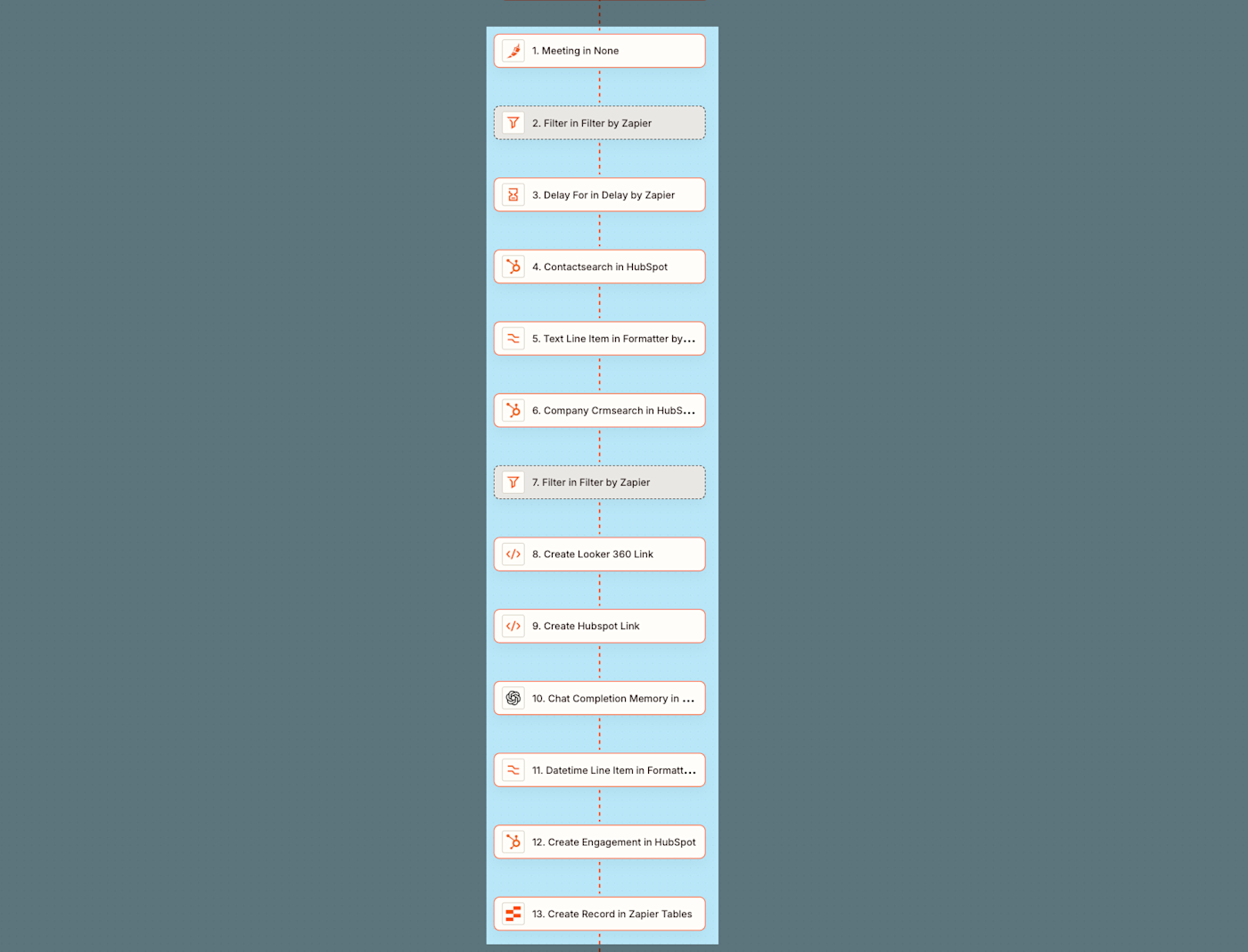
This part of the Zap automatically captures new bookings from Chili Piper and looks up contact and company details in HubSpot. It identifies paid accounts, open deals, and key company information, then stores those details in a Zapier Table—giving the sales team an organized, accessible view of their upcoming meetings.
Workflow part 2: Route call prep to the right sales rep
Zapier integrations used: Paths by Zapier, Zapier Tables

This part of the Zap uses Paths by Zapier to route upcoming meetings to the correct sales rep. Based on the meeting details, the Zap assigns the meeting to the appropriate rep's path and logs it in their individual Zapier Table, ensuring each rep has a clear, personalized view of their upcoming calls.
Workflow part 3: Use AI to identify talking points
Zapier integrations used: Zapier Tables, Slack, ChatGPT, HubSpot
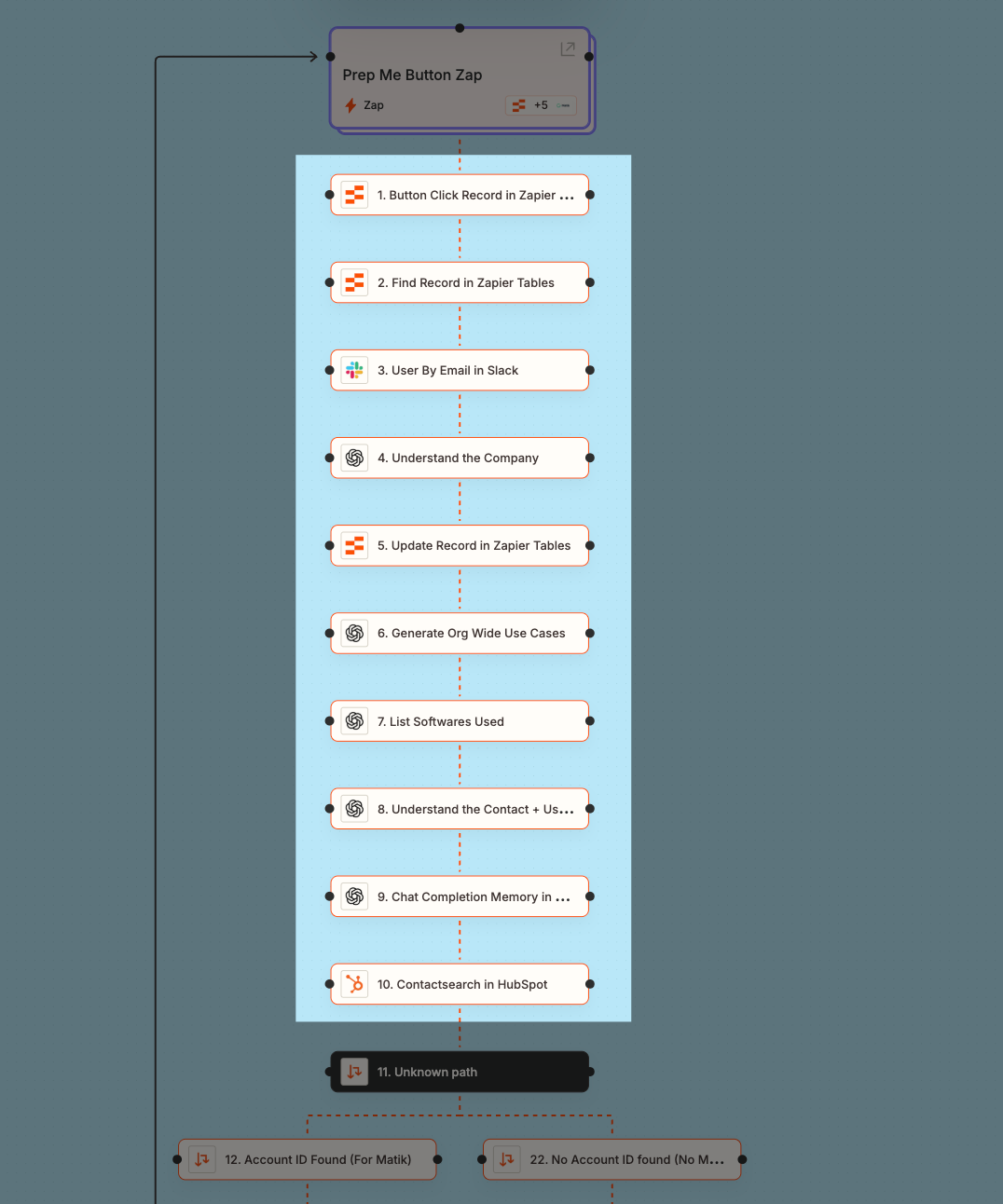
Whenever a sales rep clicks the Prep Me button in their relevant table, a Zap uses ChatGPT to analyze the company, identify key software tools they use, and generate use cases and conversation points, ensuring reps are fully prepared for their calls.
Workflow part 4: Create sales decks with company details
Zapier integrations used: Paths by Zapier, Zapier Tables, Slack
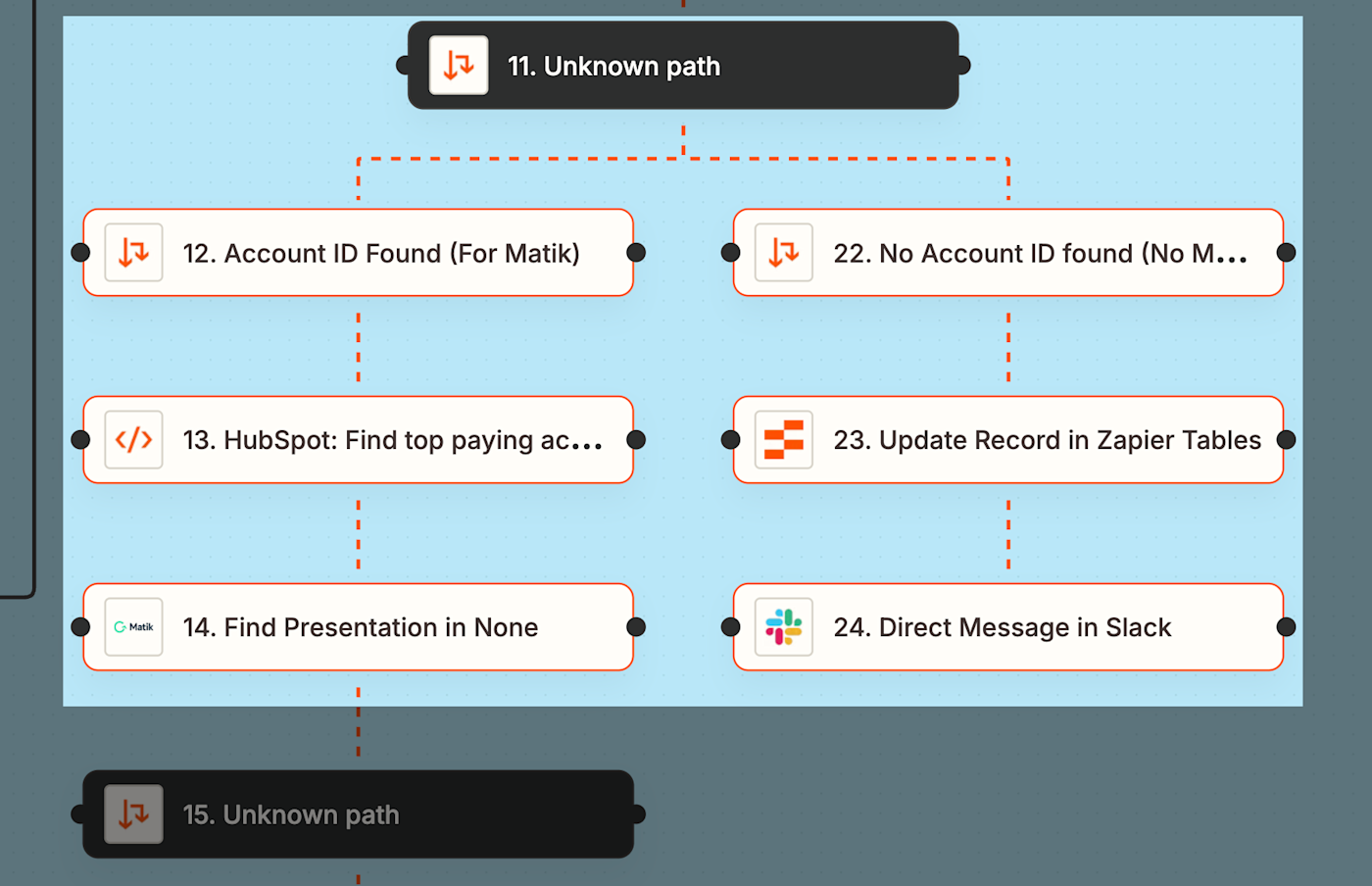
This part of the Zap determines whether an account has a paid subscription by checking for an Account ID. If found, it retrieves top-paying account details from HubSpot and creates a sales deck to assist the sales rep. If no Account ID is found, the Zap updates Zapier Tables and sends a Slack notification to inform the rep.
Workflow part 5: Notify the sales rep with sales decks
Zapier integrations used: Paths by Zapier, Zapier Tables, Slack
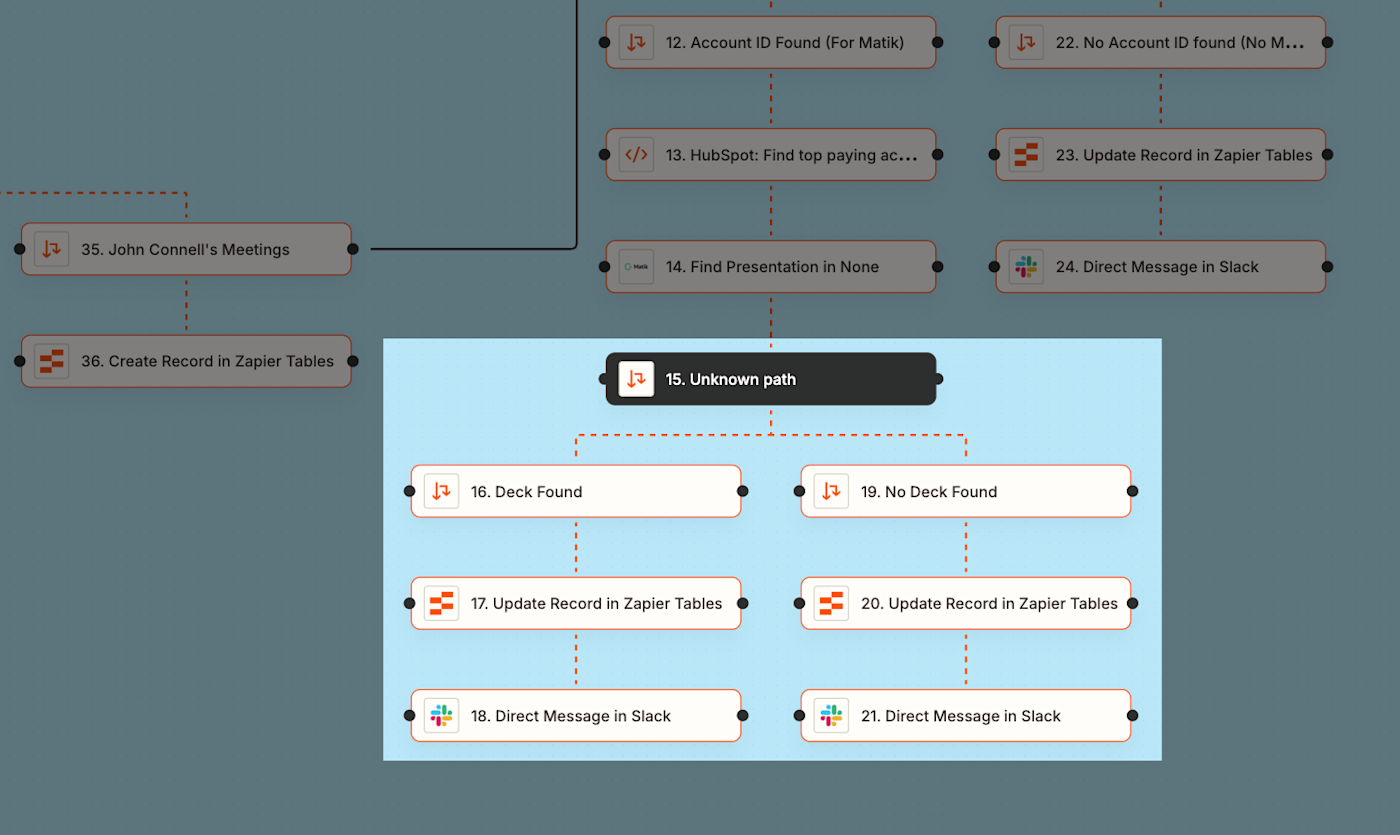
This part of the Zap determines whether a sales deck has been created for the upcoming meeting. If a deck is found, the Zap updates Zapier Tables and notifies the sales rep via Slack. If no deck is found, it still updates the table and alerts the rep, so they're informed either way.
Prompting tips for your AI steps
To get the most accurate results from your ChatGPT steps (or any other AI integration you might use), it's important to craft a clear, structured, and detailed prompt. Here are some tips for optimizing your instructions for the AI tool:
Clearly define the AI tool's role: Specify that the AI tool acts as a research assistant, gathering company insights, identifying key software, and generating use cases for sales reps.
Set clear criteria: List the types of company details, industry insights, and conversation points it should look for and generate with examples.
Ensure relevant insights: Ask AI to provide use case recommendations, key prospect details, and potential talking points to guide the conversation. Include examples of previous sales information.
Request a specific format: Ask for a structured summary that reps can quickly scan, ensuring they have the most important information at a glance.
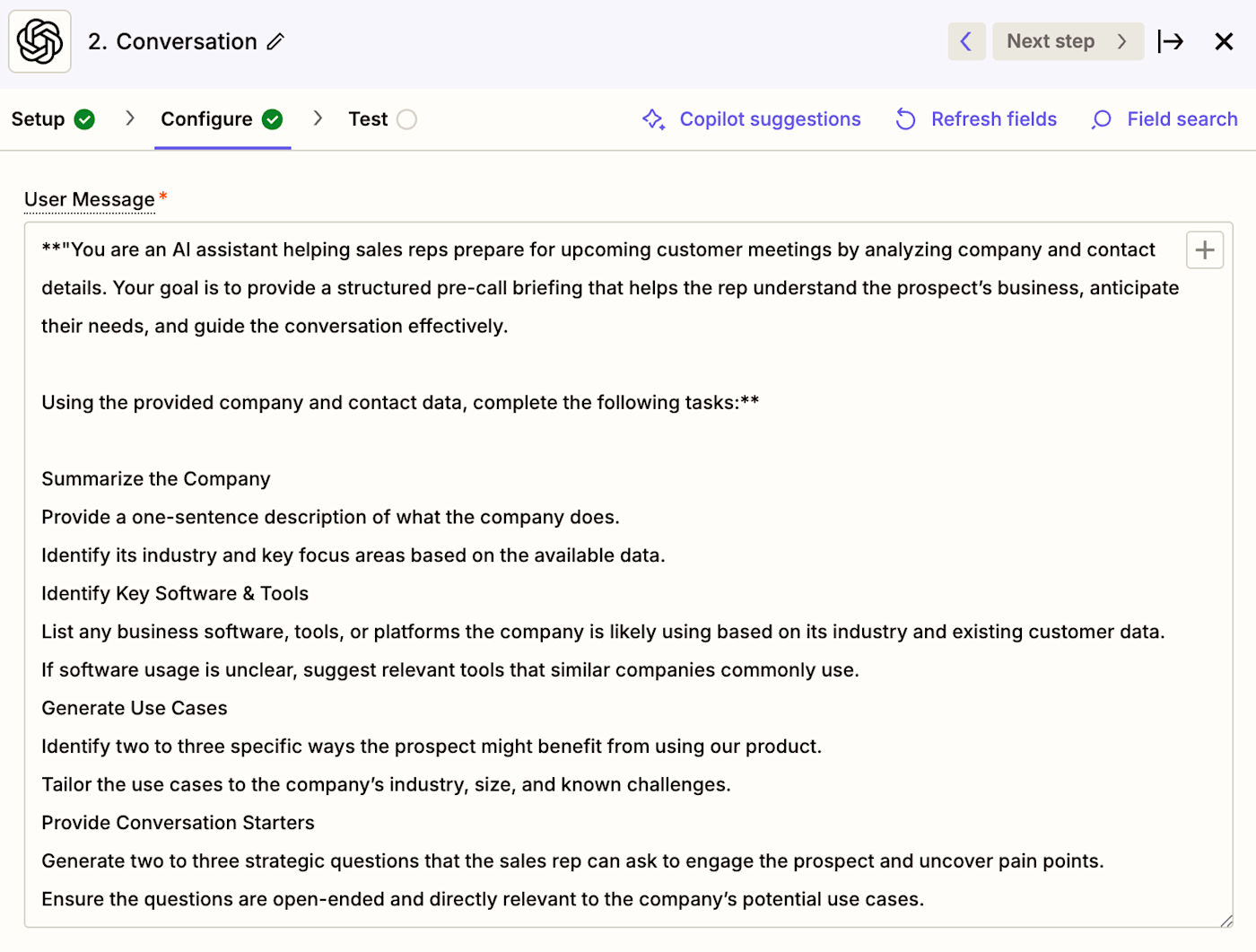
Ready to start building your Zap? Click on the pre-made template below to set up this Zap and start prepping for sales calls automatically.
Transform how your team prepares and coaches for sales calls
AI and automation are redefining how Sales and Success teams approach lead management.
Zapier's GTM leaders are already using AI-powered Zaps to streamline pre-call research, surface impactful insights, and empower reps to consistently close more deals—without the manual overhead.
So: how will AI and automation transform your sales processes?

